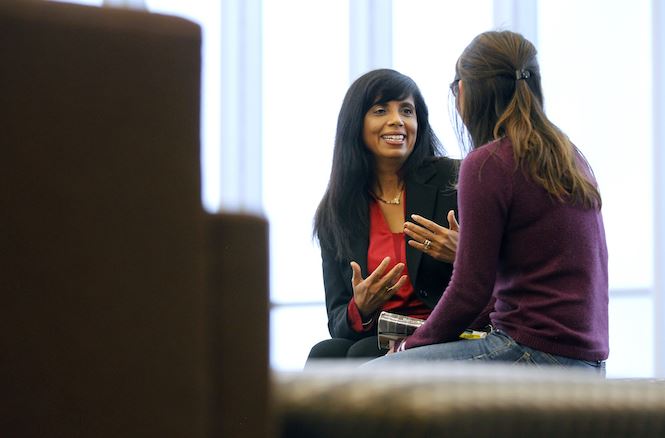Fresno State philosophy professor Dr. Veena Howard, whose expertise is in South Asian religious traditions and Gandhi’s philosophy, was elected to the board of trustees for the Parliament of the World’s Religions, a leading global interfaith organization.
In October, she took part in the board’s biennial meeting in Chicago. Planning for the November 2018 meeting of the Parliament topped the agenda. The theme for the next Parliament, to be held in Toronto, will be “Promise of Inclusion, the Power of Love: Pursuing Global Understanding, Reconciliation and Change.”
“Dr. Howard’s research manifests our college’s commitment to diversity of spiritual and religious thought,” said Dr. Saúl Jiménez-Sandoval, dean of the College of Arts and Humanities at Fresno State. “She has clearly cemented her reputation as an authority in the field of religious studies. We are grateful that such a distinguished scholar and gracious colleague has chosen Fresno State as her home.”
The mission of the Parliament of the World’s Religions is to cultivate harmony among the world’s religious and spiritual communities and foster their engagement with the world and its guiding institutions in order to achieve a just, peaceful and sustainable world.
The first Parliament was held in Chicago in 1893, a formal gathering of representatives of Eastern and Western spiritual traditions. According to the Parliament website, a captivating Hindu monk, Swami Vivekananda, addressed 5,000 assembled delegates, greeting them with the words, “Sisters and brothers of America!”, introducing Hinduism to America.
“I read the works of Swami Vivekananda and about the Parliament while growing up in India,” Howard said, “and became deeply interested in engaging in interreligious activities.”
One hundred years after that first gathering, another Parliament was held, once again in Chicago. Since then, four more have been held — in Cape Town, South Africa (1999), Barcelona, Spain (2004), Melbourne, Australia (2009) and Salt Lake City, Utah (2015). About 10,000 attendees from different religious and spiritual traditions participated in the 2015 conference.
Howard, who is the coordinator of the Peace and Conflict Studies program at Fresno State, was a featured panelist at the 2015 Parliament, during which she gave two presentations, each attended by more than 200 people:
- “What Would Gandhi Do? Moral Strategies for Sustainability, Peace and Justice.”
- “Dharma Traditions and the Question of Human-animal Relationship”
“Even though the programs of the Parliament are not solely academic,” Howard said, “they provide educational opportunities to scholars, students and practitioners to experience religions on their own terms. The Parliament events also demonstrate the ways in which religions have been engaged in addressing issues of injustice, violence, environmental crisis, intolerance, hate, etc. … It was fascinating and encouraging to see leaders and followers of dozens of religious and spiritual leaders assembled to participate in the shared vision of a just, peaceful and sustainable world.”
Howard invited one student to the 2015 conference and plans to take several Fresno State religious studies and philosophy students to the 2018 Parliament.
“Five students of religion and philosophy have expressed interest in attending the Parliament,” Howard said. “Some have already registered for the conference, and are very excited to meet some of the scholars and leaders in the fields of religion and spirituality. I am already exploring community funding opportunities to subsidize their expenses. I believe this experience would help students to expand their horizons and experience religions first hand through attending workshops, lectures and various other activities.”
In 2015, students selected Howard to be one of the three Fresno State Talks lecturers for the 2015-16 school year. Students nominate lecturers who have made a difference, challenged them to think differently or taken the time to ensure learning. Howard’s topic for the February 2016 talk was “Awakening the Force of Nonviolence: Gandhi’s Moral Experiments.”
Howard said she feels honored to be a part of the board.
“I am excited to bring insights from the Parliament back into my classroom. After the 2015 Parliament, I shared my experiences of meeting some prominent scholars and leaders of religion with my students, who were intrigued by the groundbreaking work that has been done by religions. Next year, I plan to incorporate some of the Parliament themes into my reading list, and ask my students to consider the question of relevance of religion in addressing the difficult issues of justice, sustainability, equity and human dignity.”





